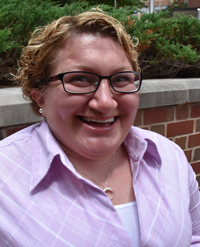Kathryn Sorensen, OTD, OTR/L, is an assistant clinical professor and academic fieldwork coordinator for the Division of Occupational Science and Occupational Therapy. The division is one of seven housed in the Department of Allied Health Sciences in the UNC School of Medicine.

Sorensen was born with osteogenesis imperfecta, a genetic disorder that results in decreased bone density. While an undergraduate at UNC-CH, Sorensen used crutches around campus and was a member of the women’s rowing team. While pursuing her master’s in occupational therapy in California, Sorensen fell and broke her hip, leading to her decision to move using a wheelchair full time.
After coming back to UNC-CH to teach, Sorensen was very surprised at how difficult it was to move around a campus that used to be more accessible to her. For example, she said she has more difficulties navigating to the Dean Smith Center from Franklin Street, which is something she had done as an undergraduate student effortlessly.
“I know how amazing UNC can be when there aren’t limitations and barriers,” Sorensen said, “It has been really hard for me to be back in a place that I had experienced freedom in, and now I’m back here and I don’t feel free to navigate my environment without facing barriers.”
Sorensen has turned her experience with a disability into advocacy. In addition to her teaching responsibilities, which include a course on disability and health, Sorensen has worked for increased visibility of and adherence to the Americans with Disabilities Act (ADA) around the UNC-CH campus. After becoming a certified ADA coordinator in the summer of 2018, Sorensen began to work with campus officials to make buildings more accessible, to include signage highlighting wheelchair-accessible entrances, and to ensure bathroom stalls remain up to code.
“A lot of these buildings were built in the 1700s and 1800s,” Sorensen said. “They’re gorgeous, but they obviously didn’t consider people with disabilities back then. Simple changes, like adding a sign indicating where the accessible entrance is, would go a long way in helping people with disabilities navigate campus much more efficiently.”
Sorensen has worked with the athletics department to make the Dean Smith Center more accessible. Currently, Sorensen said there are more than 21,000 seats; the Center is completing a project to increase ADA-accessible seats to 20 and studying the possibility of further projects. “I’ve been working with the athletics department to make sure that the Dean Dome gets up to the 94 ADA seats that it can reasonably accommodate, which is exciting.”
Sorensen has also become more passionate about the connection between occupational therapy and ADA laws in the classroom.
“I’m becoming more passionate about teaching occupational therapists (OTs) about the ADA law because we’ve work with people with physical, visual and cognitive impairments that prevent them from being able to access the world the way that it was built for people without an impairment,” Sorensen said. “These laws are in place to help close that gap and I can’t think of anyone who is better positioned than OTs to help people with disabilities understand what the law is and know their rights.”
Sorensen is professionally associated with the American Occupational Therapy Association (AOTA). She recently participated in AOTA’s Hill Day, a day designed for advocates to meet with congressional leaders to talk to them about bills on the docket in Congress that affect occupational therapy.
“It was really neat to exercise my rights as a citizen to go meet with my congressman about issues that are important to me.”
—Brooke Love, communications intern